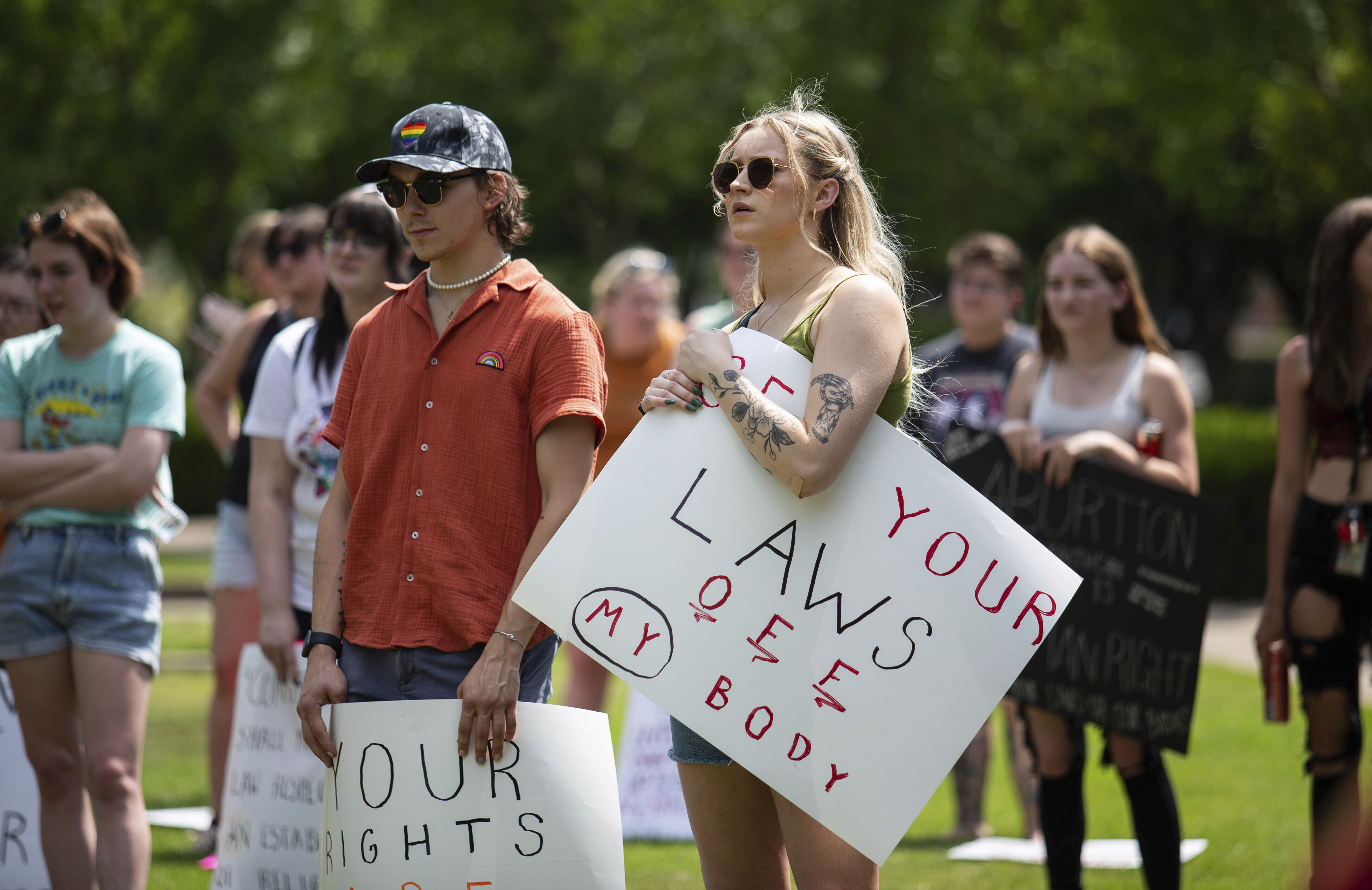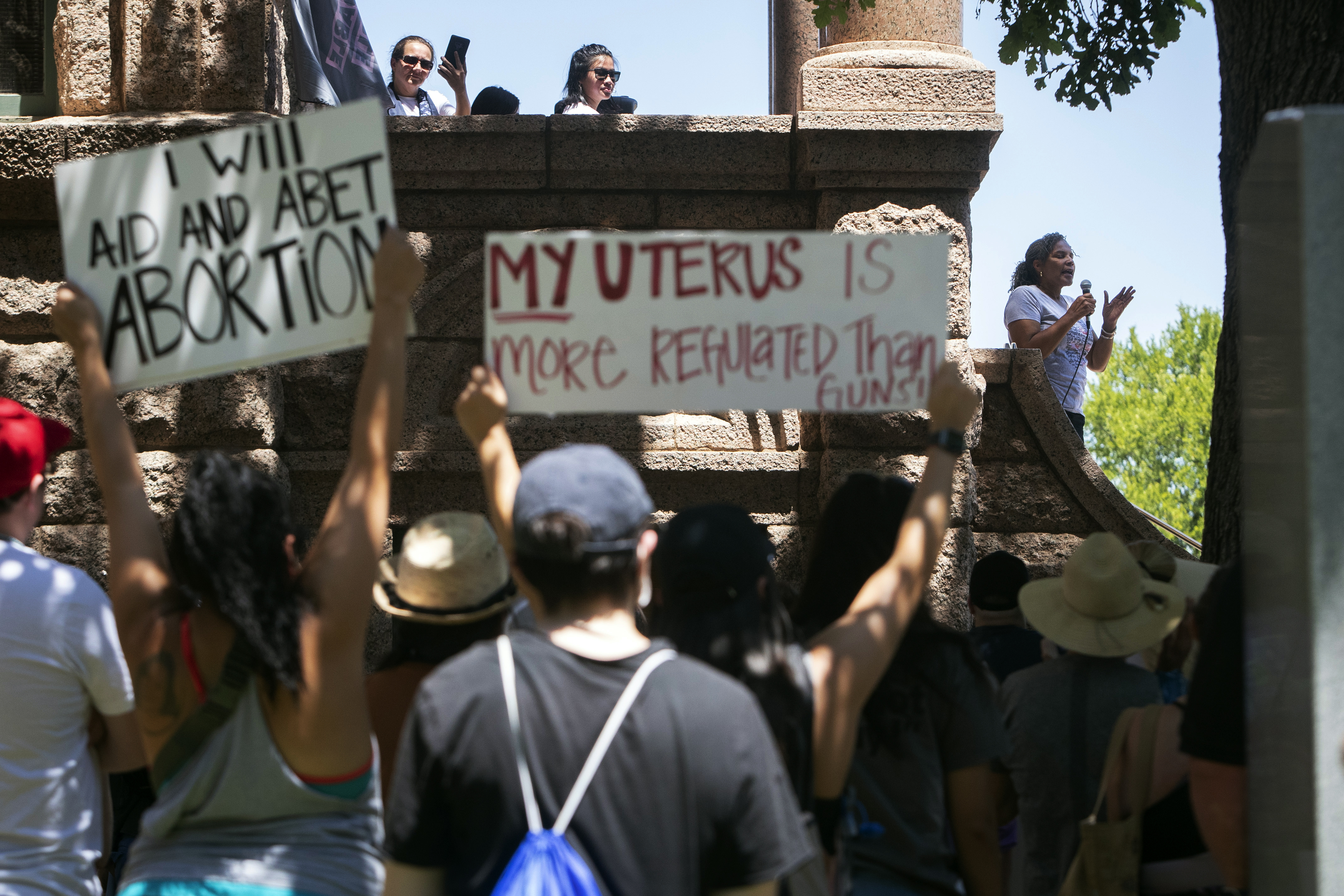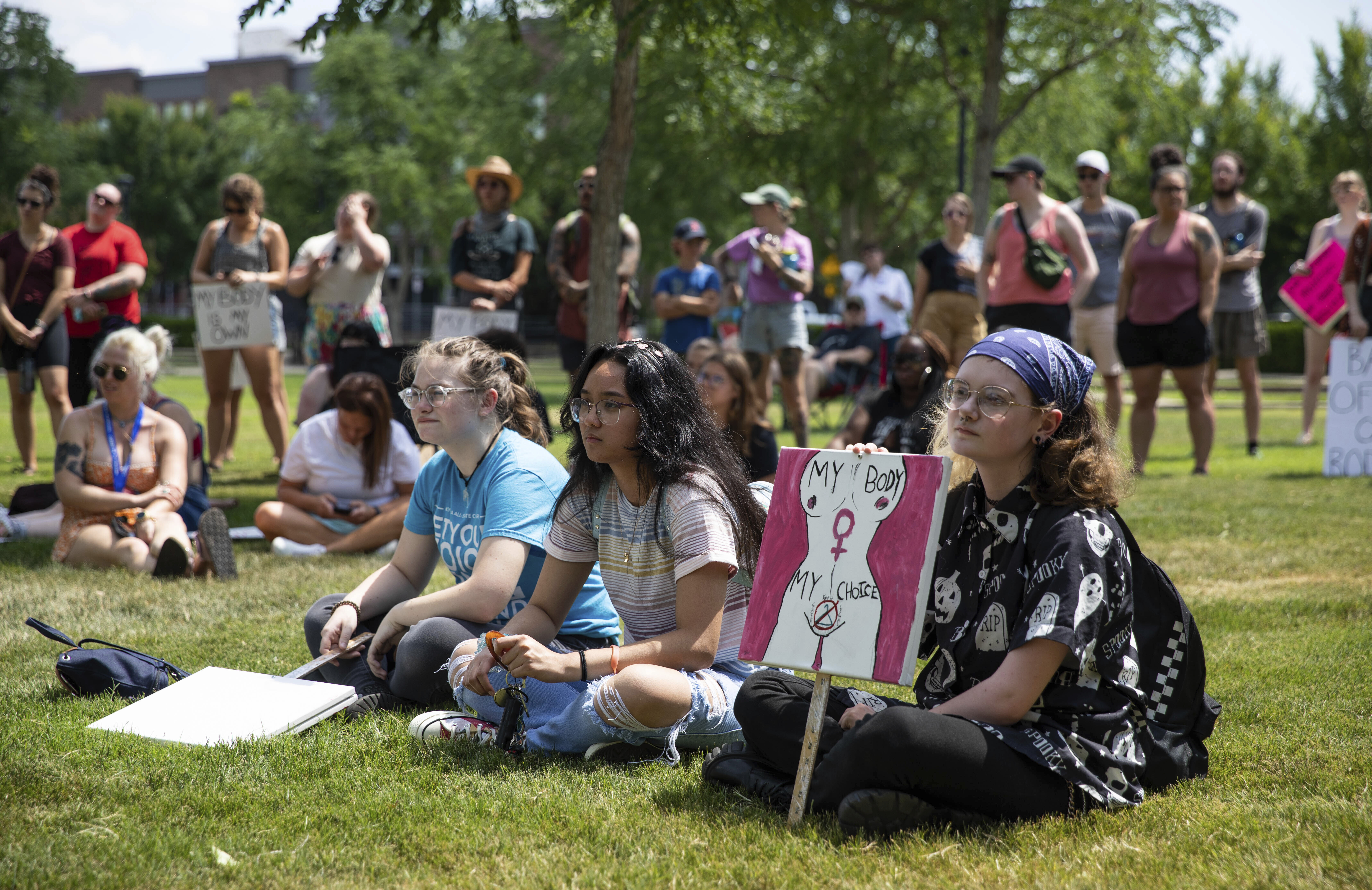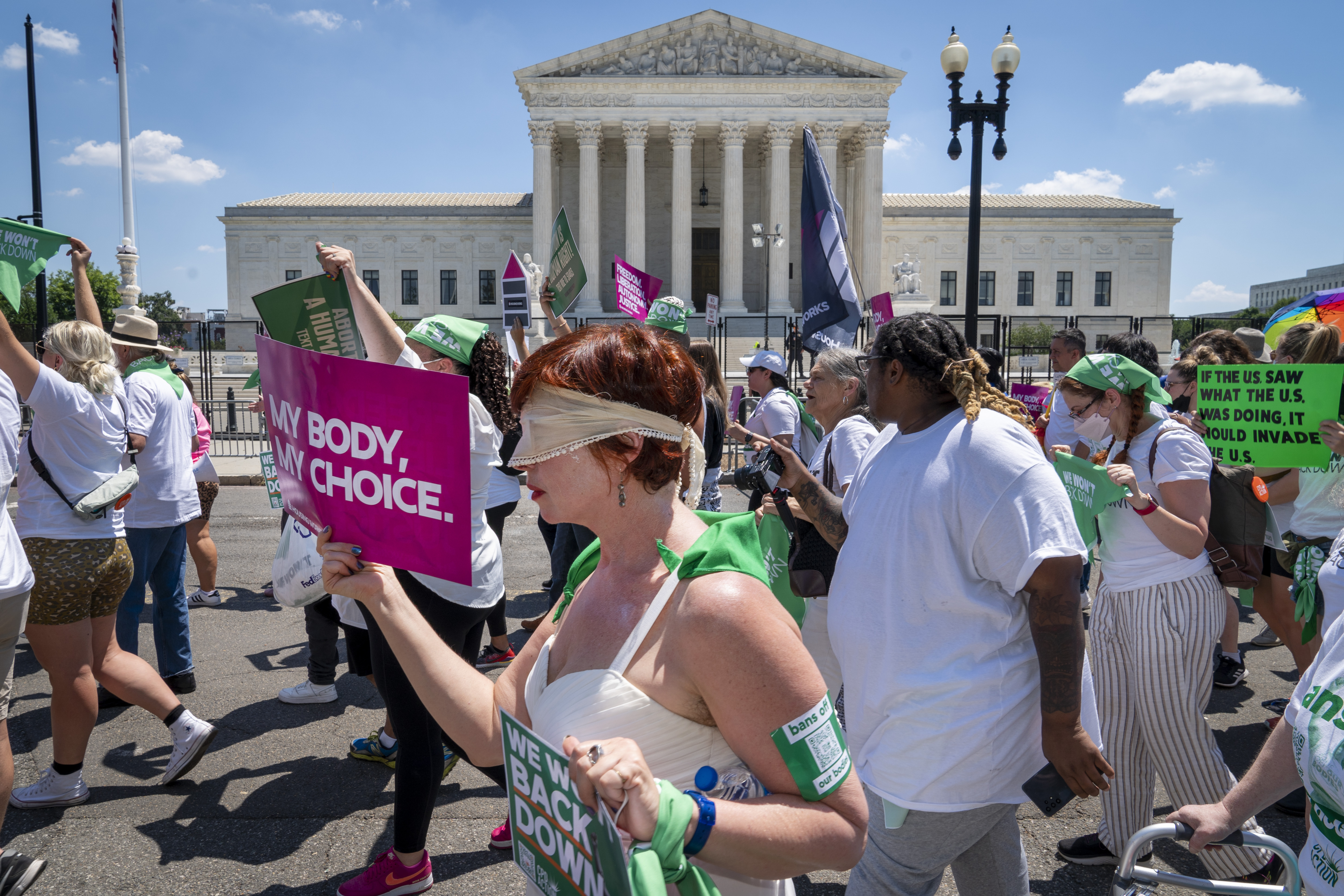TALLAHASSEE, Fla. -- Abortion providers and patients were struggling Friday to navigate the evolving legal landscape around abortion laws and access across the country since the U.S. Supreme Court overturned Roe v. Wade last week.
In Florida, a law banning abortions after 15 weeks went into effect Friday, the day after a judge called it a violation of the state constitution and said he would sign an order temporarily blocking the law next week. The ban could have broader implications in the South, where the state has wider access to the procedure than its neighbors.
Abortion rights have been lost and regained in the span of a few days in Kentucky. A so-called trigger law imposing a near-total ban on the procedure took effect June 24, but a judge blocked the law Thursday, meaning the state's only two abortion providers can resume seeing patients -- for now.
In Texas, abortions up to six weeks resumed at some clinics after a Houston judge said patients still had that right, at least until a new ban on virtually all abortions takes effect in the coming weeks. But the state has asked the Texas Supreme Court to block that order and allow prosecutors to enforce a ban on abortion now, adding to the uncertainty.
The legal wrangling is likely to continue to cause chaos for Americans seeking abortions in the near future, with court rulings able to upend access at a moment's notice and an influx of new patients from out of state overwhelming providers.
Even when women travel outside states with abortion bans in place, they may have fewer options to end their pregnancies as the prospect of prosecution follows them.
Planned Parenthood of Montana this week stopped providing medication abortions to patients who live in states with bans "to minimize potential risk for providers, health center staff, and patients in the face of a rapidly changing landscape."
Planned Parenthood North Central States, which offers the procedure in Minnesota, Iowa and Nebraska, is telling its patients that they must take both pills in the regimen in a state that allows abortions.
"There's a lot of confusion and concern that the providers may be at risk, and they are trying to limit their liability so they can provide care to people who need it," said Dr. Daniel Grossman, who directs the research group Advancing New Standards in Reproductive Health at the University of California San Francisco.
In an "unknown and murky" legal environment, Planned Parenthood North Central States spokeswoman Emily Bisek said it decided to tell patients they must be in a state where it is legal to complete the medication abortion -- which requires taking two drugs 24 to 48 hours apart. She said most patients from states with bans are expected to opt for surgical abortions.
QUESTION OF PILLS
The use of abortion pills has been the most common method to end a pregnancy since 2000, when the Food and Drug Administration approved mifepristone -- the main drug used in medication abortions. Taken with misoprostol, a drug that causes cramping that empties the womb, it constitutes the abortion pill.
Access to the pills has become a key battle in abortion rights, with the Biden administration preparing to argue states can't ban a medication that has received FDA approval.
Kim Floren, who operates an abortion fund in South Dakota called Justice Empowerment Network, said the development would further limit the choices women have and likely mean more will travel to Colorado for an abortion.
"The purpose of these laws anyways is to scare people," Floren said of states' bans on abortions and telemedicine consultations for medication abortions. "The logistics to actually enforcing these is a nightmare, but they rely on the fact that people are going to be scared."
A South Dakota law took effect Friday that threatens a felony punishment for anyone who prescribes medication for an abortion without a license from the South Dakota Board of Medical and Osteopathic Examiners.
"Doctors who knowingly break the law and prescribe these medications to end a human life will be prosecuted, " Republican Gov. Kristi Noem, an opponent of abortion, said in a statement.
In Alabama, Attorney General Steve Marshall's office said it is reviewing whether people or groups could face prosecution for helping women fund and travel to out-of-state abortion appointments.
Yellowhammer Fund, an Alabama-based group that helps low-income women cover abortion and travel costs, said it is pausing operation for two weeks because of the lack of clarity under state law.
"This is a temporary pause, and we're going to figure out how we can legally get you money and resources and what that looks like," said Kelsea McLain, Yellowhammer's health care access director.
Laura Goodhue, executive director of the Florida Alliance of Planned Parenthood Affiliates, said staff members at its clinics have seen women driving in from as far away as Texas without stopping or making an appointment.
Women who are past 15 weeks are being asked to leave their information and promised a call back when a judge signs the order temporarily blocking the restriction, she said. Still, there is concern that the order may be only temporary and the law may again go into effect later, creating additional confusion.
"It's terrible for patients," she said. "We are really nervous about what is going to happen."
DIVISION IN ARIZONA
Politicians and state government attorneys are trying to sort out which laws and which provisions are in force. And abortion rights advocates who are going to court to protect the right to terminate a pregnancy are finding themselves doing battle on multiple fronts.
In Arizona, Republicans are fighting among themselves over whether a 121-year-old anti-abortion law from the pre-statehood Wild West days, when Arizona was still a frontier mining territory, should be enforced over a 2022 version.
Attorney General Mark Brnovich announced Wednesday that a pre-statehood law banning all abortions is now enforceable, but Republican Gov. Doug Ducey has said a law he signed in March takes precedence over the 1901 ban.
Jared Keenan, Legal Director at American Civil Liberties Union of Arizona, said there has been "hectic" activity in the post-Roe v. Wade world.
"That's the nature of civil-rights litigation," Keenan said. "I think that the difference here is that it has thrown a lot of organizations and a lot of attorneys into this sort of manic scramble all at the same time, which is not so common."
Meanwhile, in Idaho, it is not clear whether a pair of laws from the early 1970s making it a felony to "knowingly aid" in an abortion or to publish information about how to induce one will be enforced alongside the state's newer, near-total ban.
Lawyers in Idaho Attorney General Lawrence Wasden's office are going through all the state's abortion statutes with a fine-tooth comb, spokesman Scott Graf said.
"Following last week's decision, part of our subsequent work is to now review Idaho's existing abortion-related laws and examine them through a post-Roe legal lens," Graf said. "That work has commenced and will continue in the weeks ahead."
When the Idaho Legislature passed a trigger law in 2020 that would automatically prohibit nearly all abortions 30 days after the fall of Roe, lawmakers took some steps to avoid conflicts by making it clear that the law would supersede other bans.
Lawmakers put similar language in another ban passed earlier this year, saying the 2020 law would take precedence. But they may have overlooked a few clauses in the decades-old statutes.
The 2020 trigger law says specifically that the person seeking the abortion can't be charged with a crime, instead focusing prosecution efforts on the abortion provider.
That would seem to override a 1973 law that makes it a felony for a person to undergo an abortion. But it's not clear if another portion of the older law making it a felony to knowingly aid in an abortion could still be enforceable.
"It's hard to see how much of it survives, because of all the conflicts," Twin Falls County prosecutor Grant Loebs said of the nearly 36 anti-abortion laws on the books in Idaho.
It will be up to individual county prosecutors, at first, to decide how to proceed, said Loebs, who is also president of the Idaho Prosecuting Attorneys Association. From there, judges will figure it out.
Ultimately, he expects Idaho legislators will have a lot of fine-tuning to do in the years ahead.
"I think every state doing this is going to have the same problems," Loebs said.
Planned Parenthood is suing over both of Idaho's newer laws. It has asked the Idaho Supreme Court to hear arguments in both cases on the same day in early August in hopes of getting a ruling before the trigger law takes effect.
STATES OF CONFUSION
On the abortion rights side, Hillary Schneller, senior staff attorney for the Center for Reproductive Rights, said Louisiana lawmakers had passed three "trigger" bans designed to go into effect in the event Roe was overturned.
When the Supreme Court decision came down, "state officials issued conflicting statements about those bans," Schneller said. "We challenged all of them on vagueness grounds to try to get some clarity about what the status of the law is in Louisiana."
Jennifer Sandman, a senior attorney for Planned Parenthood Federation of America, said the confusing and "very rapidly shifting landscape both legally and operationally" is putting more stress on abortion providers.
"I think multiple health care providers across the country are figuring out how to navigate that moment," Sandman said.
In West Virginia, the ACLU filed a lawsuit challenging an abortion ban that was put on the books in 1882. The organization claims the law conflicts with newer ones and so should be void.
Wisconsin Attorney General Josh Kaul filed a lawsuit Tuesday challenging a 173-year-old abortion ban, arguing that modern generations never consented to it.
The 1849 law prohibits abortion in every instance except to save the pregnant person's life -- conflicting with Wisconsin laws from the mid-1980s that ban the procedure after a fetus reaches the point when it could survive outside the womb with medical intervention.
Information for this article was contributed by Anthony Izaguirre, Stephen Groves, Dylan Lovan, Adriana Gomez Licon, Kim Chandler, Rebecca Boone and Claire Rush of The Associated Press.
 FILE - Community members gather to protest the U.S. Supreme Court's overturning of Roe v. Wade and Kentucky's trigger law to ban abortion, at Circus Square Park in Bowling Green, Ky., on Saturday, June 25, 2022. A judge cleared the way Thursday, June 30, for abortions to resume in Kentucky, temporarily blocking the state’s near-total ban on the procedure that was triggered by the Supreme Court ruling that overturned Roe v. Wade. (Grace Ramey/Daily News via AP, File)
FILE - Community members gather to protest the U.S. Supreme Court's overturning of Roe v. Wade and Kentucky's trigger law to ban abortion, at Circus Square Park in Bowling Green, Ky., on Saturday, June 25, 2022. A judge cleared the way Thursday, June 30, for abortions to resume in Kentucky, temporarily blocking the state’s near-total ban on the procedure that was triggered by the Supreme Court ruling that overturned Roe v. Wade. (Grace Ramey/Daily News via AP, File) Abortion-rights advocates gather outside the Tarrant County Courthouse during the Bans Off Our Bodies protest in Fort Worth, Texas, on Saturday, June 25, 2022. Alternating between chants of "My body, my choice!" and "Reproductive rights are human rights!" the crowd marched downtown. (Madeleine Cook/Star-Telegram via AP)
Abortion-rights advocates gather outside the Tarrant County Courthouse during the Bans Off Our Bodies protest in Fort Worth, Texas, on Saturday, June 25, 2022. Alternating between chants of "My body, my choice!" and "Reproductive rights are human rights!" the crowd marched downtown. (Madeleine Cook/Star-Telegram via AP) FILE - South Dakota Gov. Kristi Noem, speaks at the Conservative Political Action Conference (CPAC), Feb. 25, 2022, in Orlando, Fla. Former South Dakota Attorney General Jason Ravsborg has asked a state ethics board to press for an investigation Monday, June 27, 2022, of Noem. Ravnsborg blames the governor for his impeachment and removal from office last week for his conduct surrounding a fatal crash in 2020. (AP Photo/John Raoux, File)
FILE - South Dakota Gov. Kristi Noem, speaks at the Conservative Political Action Conference (CPAC), Feb. 25, 2022, in Orlando, Fla. Former South Dakota Attorney General Jason Ravsborg has asked a state ethics board to press for an investigation Monday, June 27, 2022, of Noem. Ravnsborg blames the governor for his impeachment and removal from office last week for his conduct surrounding a fatal crash in 2020. (AP Photo/John Raoux, File) Casper Byrd, right, of Bowling Green, sits with friends as they listen to various speakers share their experiences with abortion and women's rights at the BG Freedom Walkers' protest against the overturning of Roe v. Wade and Kentucky's trigger law to ban abortion, at Circus Square Park in Bowling Green, Ky., Saturday, June 25, 2022. (Grace Ramey/Daily News via AP)
Casper Byrd, right, of Bowling Green, sits with friends as they listen to various speakers share their experiences with abortion and women's rights at the BG Freedom Walkers' protest against the overturning of Roe v. Wade and Kentucky's trigger law to ban abortion, at Circus Square Park in Bowling Green, Ky., Saturday, June 25, 2022. (Grace Ramey/Daily News via AP)Gallery: United States, post-Roe, day 8

